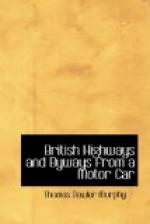When we drew our car up in front of the castle it was in gala attire and was the scene of activity which we were at a loss to account for. We soon learned that the Wesleyans, or Welsh Methodists, were holding a festival in the castle, and the shilling we paid for admission included a nicely served lunch, of which the Welsh strawberries were the principal feature. The occasion was enlivened by music from the local band and songs by young girls in the old Welsh costume. This led us to ask if the Welsh language were in common use among the people. We were told that while the older people can speak it, it does not find much favor among the younger generation, some of whom are almost ashamed to admit knowledge of the old tongue. English was spoken everywhere among the people at the gathering, and the only Welsh heard was in some of the songs by the girls. We wandered about the ruin and ascended the towers, which afford a fine view of the town and river. There seems to have been little done in the way of restoration, or repair, but so massive are the walls that they have splendidly stood the ravages of time.
On leaving Conway we crossed the suspension bridge, paying a goodly toll for the privilege. It was already growing late when we left the town, but the fine level road and the unusually willing spirit evinced by our motor enabled us to cover the fifty miles to Chester before night set in.
IX
Chester to “The HIELANDS”
Chester stands a return visit well, and so does the spacious and hospitable Grosvenor Hotel. It was nearly dark when we reached the city and the hotel was crowded, the season now being at its height. We had neglected to wire for reservation, but our former stop at the hotel was not forgotten and this stood us in good stead in securing accommodations. So comfortably were we established that we did not take the car out of the garage the next day but spent our time in leisurely re-visiting some of the places that had pleased us most.
The next day we were early away for the north. I think that no other stretch of road of equal length was more positively unattractive than that we followed from Chester to Penrith. Even the road-book, whose “objects of interest” were in some cases doubtful, to say the least, could name only the battlefield of 1648 near Preston and one or two minor “objects” in a distance of one hundred miles. I recalled the comment of the Touring Secretary of the Motor Union as he rapidly drew his pencil through this road as shown on the map: “Bad road, rough pavement, houses for thirty miles at a stretch right on each side of the street, crowds of children everywhere—but you cannot get away from it very well.” All of which we verified by personal experience.




